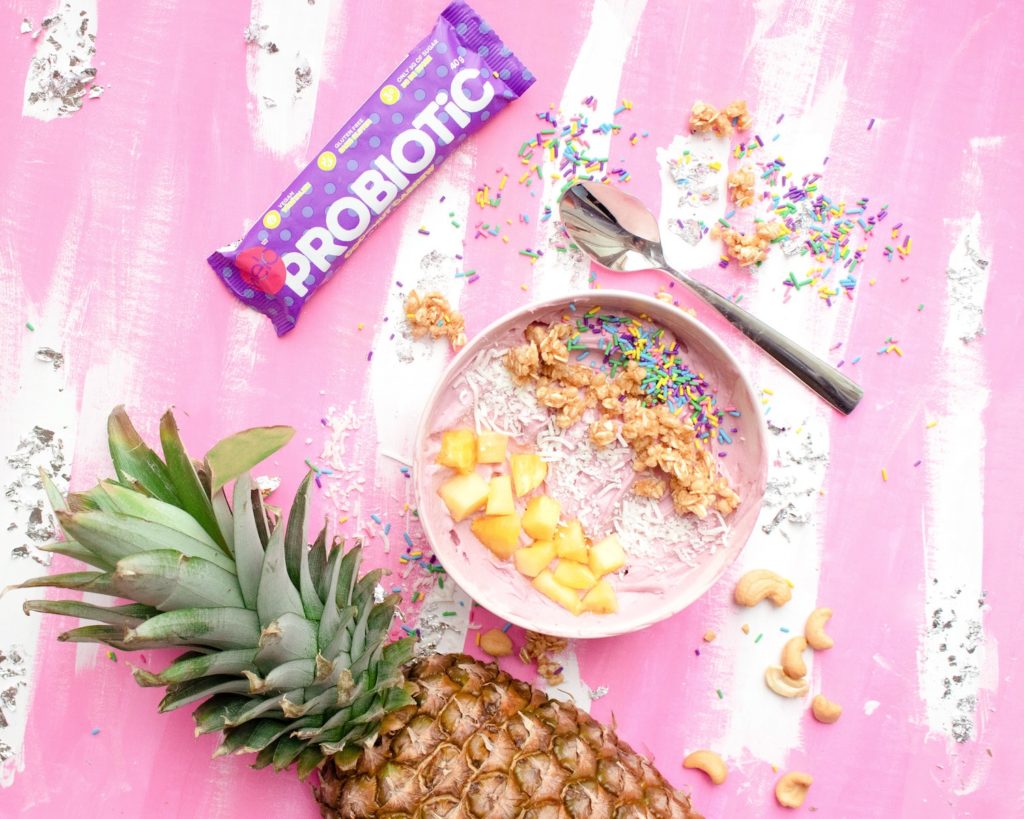The post Biotics Explained: The Wellness Benefits of Prebiotics, Probiotics, And Postbiotics appeared first on Peaceful Dumpling.

Right now, inside of you, there are trillions of microrganisms—from bacteria and viruses to fungi and other life forms—all hanging out within your digestive system.
And although the words bacteria and viruses may leave a bad taste in your mouth, all of these microorganisms (both good and bad) make up your gut microbiome, which, when healthy and functional, is an essential ingredient to your overall health and happiness. According to Healthline.com, a healthy gut microbiome has been linked with weight loss, overall heart health, reduced risk of diabetes, and even mental health too!
One of the easiest ways to achieve a healthy gut is to incorporate the three biotics into your diet and overall health: prebiotics, probiotics, and postbiotics. But what are these ‘biotics’ and how are they each different? Read on to find out everything you need to know to get your gut back on track!
Prebiotics
What Are They
A prebiotic is a type of plant-based fiber found in food, digestible by the beneficial bacteria in your gut.
Why They Matter
Prebiotics kickstart a healthy microbiome as food for the beneficial bacteria (probiotics) inside your gut. They help improve calcium absorption and change how quickly the body can process carbohydrates, leading to an overall healthier metabolism.
How To Incorporate Into Your Diet
With the growing demand for prebiotics in diets, brands are creating prebiotic-rich foods such as Kellogg’s all-bran prebiotic cereal and Wonder Drink’s prebiotic kombucha. However, as long as you’re eating fiber-rich plant-based foods such as whole grains, legumes, nuts, seeds, vegetables, and fruits, you should be getting plenty of prebiotics in your diet already. You can also buy prebiotic supplements to help achieve good digestive health, but make sure to consult your healthcare provider first to determine if supplements are right for you.
Recipe To Try
Try this prebiotic-rich Peaceful Dumpling Creamy Cauliflower Salad (cauliflower and nuts are high in plant-based fiber) to incorporate into your diet.
Probiotics
What Are They
If prebiotics are the food/fuel, then probiotics are the good-for-your-gut bacteria that ingest that food to promote a healthy digestive system.
Why They Matter
By eating probiotic-rich food, you’re increasing the number of healthy and diverse bacteria in your gut, to help with overall gut health and strengthening your body and immune system against illness and infection. By increasing the number and diversity of bacteria in our gut through probiotic-rich foods, probiotics help reduce pathogenic microbes and assist with positive mental health, alleviated depression, proper digestion, and even anti-inflammation.
How To Incorporate Into Your Diet
Eat probiotic-rich, fermented foods including kimchi, kombucha, sauerkraut, tempeh, sourdough, and miso pickles. Certain companies also sell probiotic supplements, although the reviews on their overall effectiveness are mixed. Ultimately, as with prebiotics, consult your healthcare provider before adding probiotic supplements to your diet to see if they would be helpful for you.
Recipe To Try
Learn how to boost your probiotic intake with our Beginner’s Guide to Kombucha article here.
Postbiotics
What Are They
To finish out the cycle, postbiotics are the byproduct, or waste, of probiotics consuming prebiotics. Growing research suggests much of the positive effects from probiotics actually result in this postbiotic stage.
Why They Matter
Although lacking in-depth wellness coverage, this probiotic waste is responsible for health-boosting functions such as organic acids, bacteriocins, carbonic substances, and enzymes. Some examples of postbiotic chemicals include Vitamins B and K (which help with blood clotting and cell health), short-chain fatty acids (which maintain gut lining and signal between your body and brain), antimicrobial molecules (which kill harmful microbes), and bacterial fragments and cells (which helps to prime your immune system against infections).
They may also help lower blood sugar, treat diarrhea, prevent obesity, reduce inflammation, and treat diarrhea. To make postbiotics even more of a powerhouse, studies have linked postbiotics with triggering the processing of prebiotics in your digestive system, starting the prebiotic-probiotic-postbiotic cycle once again.
How To Incorporate Into Your Diet
Since postbiotics are the result of a healthy and diverse microbiome, postbiotics naturally occur if you incorporate both probiotics and prebiotics into your diet. However, some foods contain postbiotic chemicals such as short-chain fatty acids, and you can also purchase postbiotic supplements to increase the postbiotic process in your gut.
Recipe to Try
Beets are a powerful probiotic food, which in turn stimulates postbiotics. Check out this balsamic golden beet and lentil salad to supercharge your gut health.
Ultimately, this gut trifecta (prebiotics, probiotics, and postbiotics) are all a part of a system that cycles through to keep your gut healthy and happy. Do you have a favorite gut health hack or trick? Let us know in the comments below.
Additional Resources/Sources
- https://www.ncbi.nlm.nih.gov/pmc/articles/PMC3575601/
- https://miraclenoodle.com/blogs/miraclenoodle-blog/the-difference-between-prebiotics-probiotics-and-postbiotics-plus-their-benefits
- https://www.chiropractor-schaumburg.com/what-are-postbiotics-5-health-benefits/
- https://www.mayoclinic.org/prebiotics-probiotics-and-your-health/art-20390058
- https://joinzoe.com/post/prebiotics-probiotics-postbiotics
- https://www.medicalnewstoday.com/articles/323490
- https://www.yogajournal.com/lifestyle/whats-the-difference-between-prebiotics-probiotics-and-postbiotics/
- https://nutrikane.com.au/blogs/blog/what-are-prebiotics-probiotics-and-postbiotics
- https://www.health.harvard.edu/staying-healthy/can-gut-bacteria-improve-your-health
- https://www.nature.com/articles/d41586-020-00194-2
Get more like this—Sign up for our daily inspirational newsletter for exclusive content!
__
Photo: Pexels
The view other posts like this on Peaceful Dumpling.

